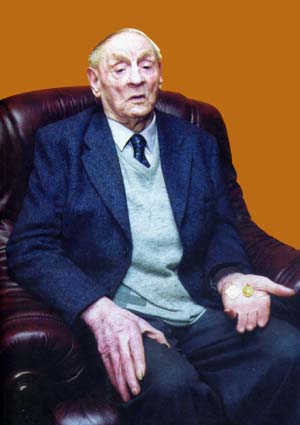Breen, Dinny
January 01, 2001

Dinny Breen shows some of his medals
The last remaining link with Westmeaths All-Ireland Junior Football success of 1929, Dinny Breen is a true legend of Lake County football.
A truly remarkable man is 94-year-old Dinny Breen, the only surviving member of Westmeath's All-Ireland Junior Football winning team of 1929. Residing in Maynooth, Co. Kildare for the past 61 years, he holds vivid memories of the '29 All-Ireland triumph, Westmeath's first in any grade of hurling and football.
Of Kerry and Galway parentage, Dinny was born in Loughrea, Co. Galway but grew up in Rochfortbridge. He quickly developed an interest in football and won a Midland Colleges medal during his days at St. Mary's CBS, Mullingar.
Breen was still in his teens when he helped the Rochfortbridge Warriors to victory over Kilbeggan in the 1923 senior championship final. Two years later, he picked up a second senior championship medal when the Warriors defeated the Athlone Army in the county decider.
"We had some great tussles back in those days," he recalls.
"Teams like Kinnegad and the Army were very difficult to beat but undoubtedly our greatest rivals were Kilbeggan. They had the best footballers and we would probably have won more but for them. Our best known footballers would have included the likes of Paddy Arthur, Paddy Whelehan, Tom Rochfort, Mick Hyland and Paddy Arthur."
After finishing school, Dinny spent a brief spell in the army before joining the Gardai. Breen was stationed in Dublin for a number of years after qualifying and could no longer give the necessary commitment to the Warriors. Instead, he joined the Garda club and went on to win four Dublin senior football championship medals with them. He also played with Parnells for a season or two and garnered one senior league memento in their colours.
Dinny's travels didn't end there. While stationed in Longford, he played a number of games for Ardagh. He also lined out for Newbridge Sarsfields before completing his club career with Maynooth.
Breen first played for the Westmeath juniors in 1928. By the All-Ireland winning year of 1929, he had established himself as an automatic choice at midfield, usually partnered by either Mick Carey of Dalystown or Kildare native Jimmy Byrne, who had been playing his club football with the Athlone Army at the time.
Despite the strength of football in Rochfortbridge during those days, Dinny was the only player from the village to feature in the All-Ireland Junior triumph. He was joined on the team by players such as Jack Dunican (Rosemount), Joe Guilfoyle, John Coughlan, Frank McGuinness and Tom Seery (Kilbeggan), Jimmy 'Steelbar' Bracken, Shea Bracken and Andy Dunne (Kinnegad) and Jim Moffat of Drumraney.
Westmeath's march to All-Ireland glory began with a 1-5 to 0-3 win over Meath. Longford were then accounted for on a 4-5 to 1-3 scoreline. In the Leinster final, Westmeath overcame Laois by 1-2 to 0-2.
The Lake County travelled to Longford to face Roscommon in the All-Ireland semi-final and came away with a 3-3 to 2-0 win. That set up a meeting with Munster champions Limerick in the All-Ireland Home final at Portlaoise. The game ended in a decisive 3-3 to 0-3 victory for the Midlanders.
The 'Away' final didn't take place until 1930 but the delay didn't affect Westmeath who overcame London by 0-9 to 1-2. The victory atoned for the disappointment of 1915 when Westmeath had lost by 0-6 to 1-2 to Kerry at the same stage.
"It was a great win for us," enthuses Dinny. "We had a fine side and no team really came close to beating us. Winning the Junior All-Ireland was a very big thing back then, only second to winning the Senior All-Ireland."
Westmeath entered the Leinster Senior Championship in 1930 and, backboned by the 1929 Junior team, qualified for their first Leinster Senior final in 1931. Breen was an important member of the senior set-up by then and played a starring role in Westmeath's first round victory over Dublin at Ballyduff Park in Tullamore.
"I got a great write-up in one of the Dublin papers after that game," he fondly recalls. "The ironic thing about it was that I had been playing my club football with Parnells at the time. That was a very proud moment for me."
Westmeath went on to meet Kildare in the Leinster decider at Croke Park but succumbed to defeat on a 2-9 to 1-6 scoreline. According to Dinny, it was no disgrace losing to the Lilywhites as they had been the most powerful force in Leinster during that era.
"It was an honourable defeat to Kildare. They won the All-Ireland titles of 1927 and '28 and hadn't been beaten in Leinster for years. We could hold our own against any team in the province but Kildare were a cut above the rest," he explains.
Owing to Garda duties, Dinny brought his inter-county career to an end shortly after the Leinster final. Some time later, he was approached to play for Dublin but declined the offer.
In 1935, Breen achieved one of his greatest honours when he won a Railway Cup medal with Leinster. He didn't play in the final against Munster but had featured in the semi-final win over Connacht at the newly-opened Cusack Park, Mullingar.
Dinny retired from the Gardai in 1966, having served 35 years. He received a Hall of Fame award from the St. Mary's club in Rochfortbridge some years ago and, despite living in Maynooth since 1939, hasn't lost his wonderful passion for Westmeath football.
Most Read Stories

